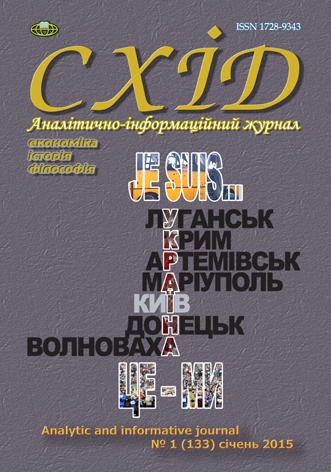Narrative: reality or construction of reality
DOI:
https://doi.org/10.21847/1728-9343.2015.1(133).40157Keywords:
narrative, reality, interpretation, constructAbstract
In the article the main characteristics and the main features of narrative are determined. The author considers narrative enables social construction of reality and finding of the basis of being. Social reality opens the opportunities of the analysis, it gives different material for understanding how narratives are displayed in different spheres of social life. In the article narrative is defined as a fundamental component of social interaction which carries out the function of creation and translation of social knowledge. With the narrative there is the selection and interpretation of facts and events, and their transformation in a specific subject that must explain why these events happened exactly this way. Narrative as a specific type of knowledge, is not simply records events, it constructs and interprets them as an important part of the whole, and the whole may be the situation or the society, the project or the life of a person.
There is the great number of interpretations of the experience, giving sense, as a social subject is autonomous, and the world is always open to new interpretations and transformations. Narratives are as a method of giving meaning to human action. Narrative analysis does not establish the truth of an individual explanation, it is not the main task for it. Because the narrative is self-description of the subject, where the acts of telling about yourself are fundamental to the reality of subjective existence. Narrative analysis considers language especially as a method and condition of constructing. There is the general representation of social reality in narrative, and this social reality is the result of constructivist activity and interpretation.
So, the most researchers believe that the conception of the past can not be objective in principle. This position offers to recognize the narrative knowledge as knowledge, which depends on the specific social and political reasons.Downloads
References
Ankersmit F. R. (2003), Narrative logic: a semantic analysis of the historian's language, Ideia-Press, Moscow, 360 p. (rus).
Berger P., Lukman T. (1995), The social construction of reality, Меdium, Moscow, 336 p. (rus).
Brokmeir I., Kharre R. (2000), Narrative: problems and promises of an alternative paradigm, Vоprosy filosofii, № 3, pp. 29-42 (rus).
Vorobyova A. (1999), Text or reality: poststructuralism in the sociology of knowledge, Journal of Sociology, № 3/4, pp. 90-99 (rus).
Zenkin S. (2005), The witnesses, historians, philologists, New Literary Review, № 74, pp. 134-141 (rus).
Liotar Zh.-F. (1998), The postmodern condition, translated from the French, Аleteia, St.Petersburg, 278 p. (rus).
Trotsuk I. (2004), Narrative as an interdisciplinary methodological construct in the modern social sciences, Vеstnik RUDN, series "Sociology", № 6-7, pp. 56-74 (rus).
Yarskaya-Smirnova E. (1997), Narrative analysis in sociology, Journal of Sociology, № 3, pp. 38-61 (rus).
Czarniawska B. (2004), Narratives in social science research, Sage Publications, London, 157 p. (engl).
Mink L. O. (1978), Narrative Form as a Cognitive Instrument in: The Writing of History. Literary Form and historical Understanding, Madison, pp. 129-149 (engl).
Downloads
Published
How to Cite
Issue
Section
License
Copyright (c) 2015 Halyna Dyakovska

This work is licensed under a Creative Commons Attribution-NonCommercial-NoDerivatives 4.0 International License.
1. Authors bear responsibility for the accuracy of facts, quotations, numbers and names used.
2. Manuscripts are not sent back.
3. The publisher does not always agree with the authors' opinion.
4. The authors reserve the right to authorship of the work and pass the first publication right of this work to the journal under the terms of a Creative Commons Attribution-NonCommercial-NoDerivatives 4.0 International License. This license allows others to distribute (copy) the published work for non-commercial purposes, provided there is mandatory attribution to its authors and a link to the first publication in our journal.
5. The authors have the right to conclude separate supplement agreements that relate to non-exclusive work distribution in the form in which it has been published by the journal (for example, to upload the work to the online storage of the journal or publish it as part of a monograph), provided that the reference to the first publication of the work in this journal is included.

